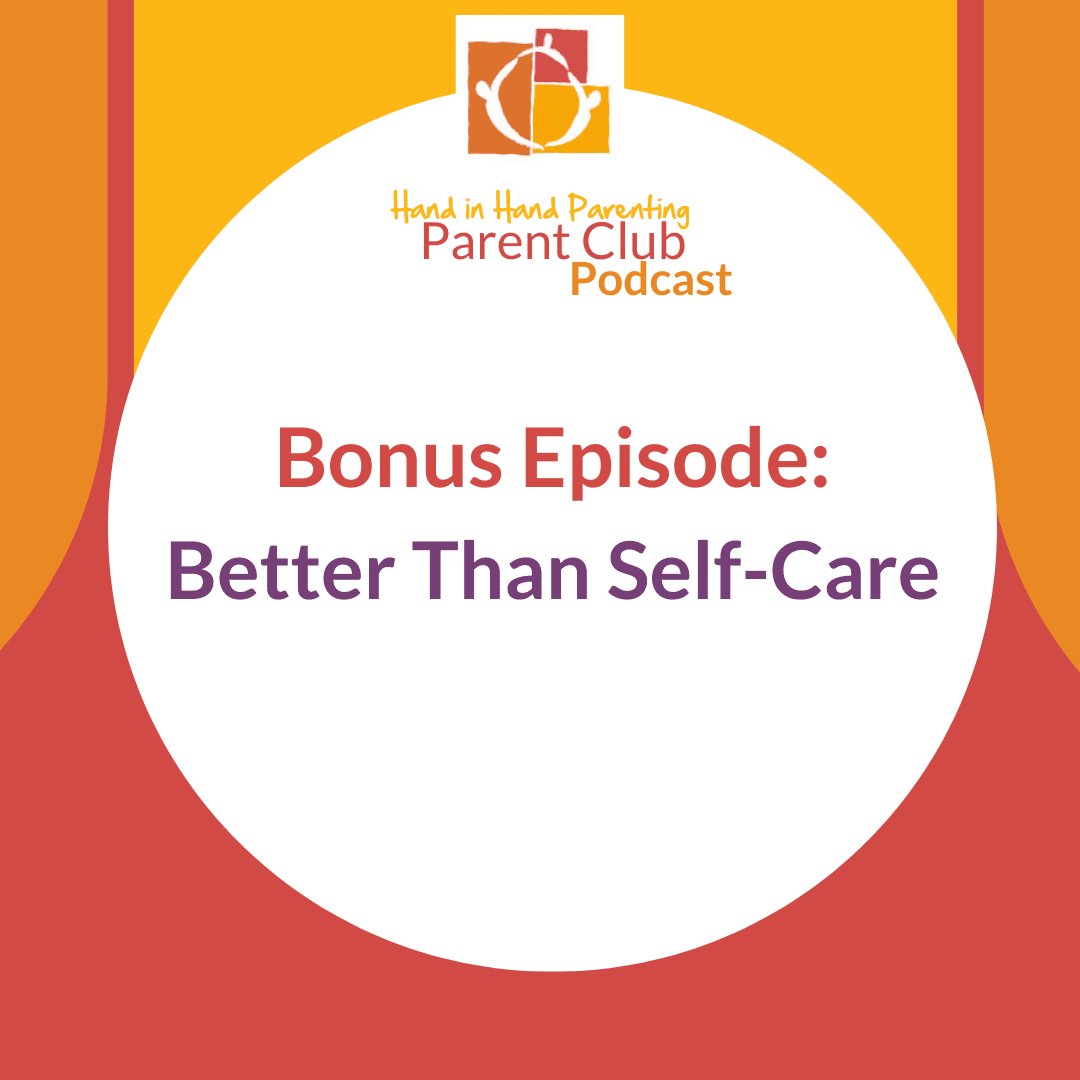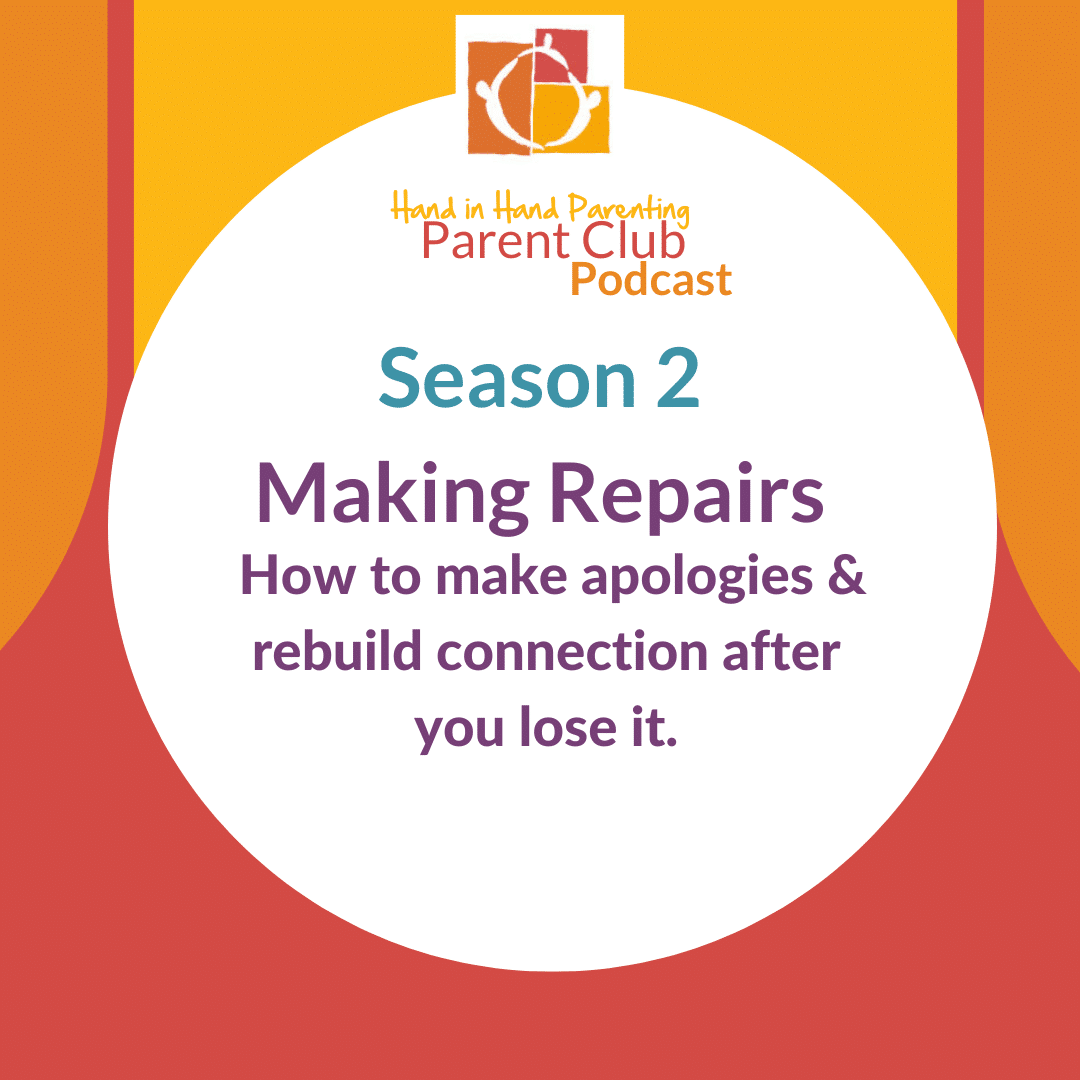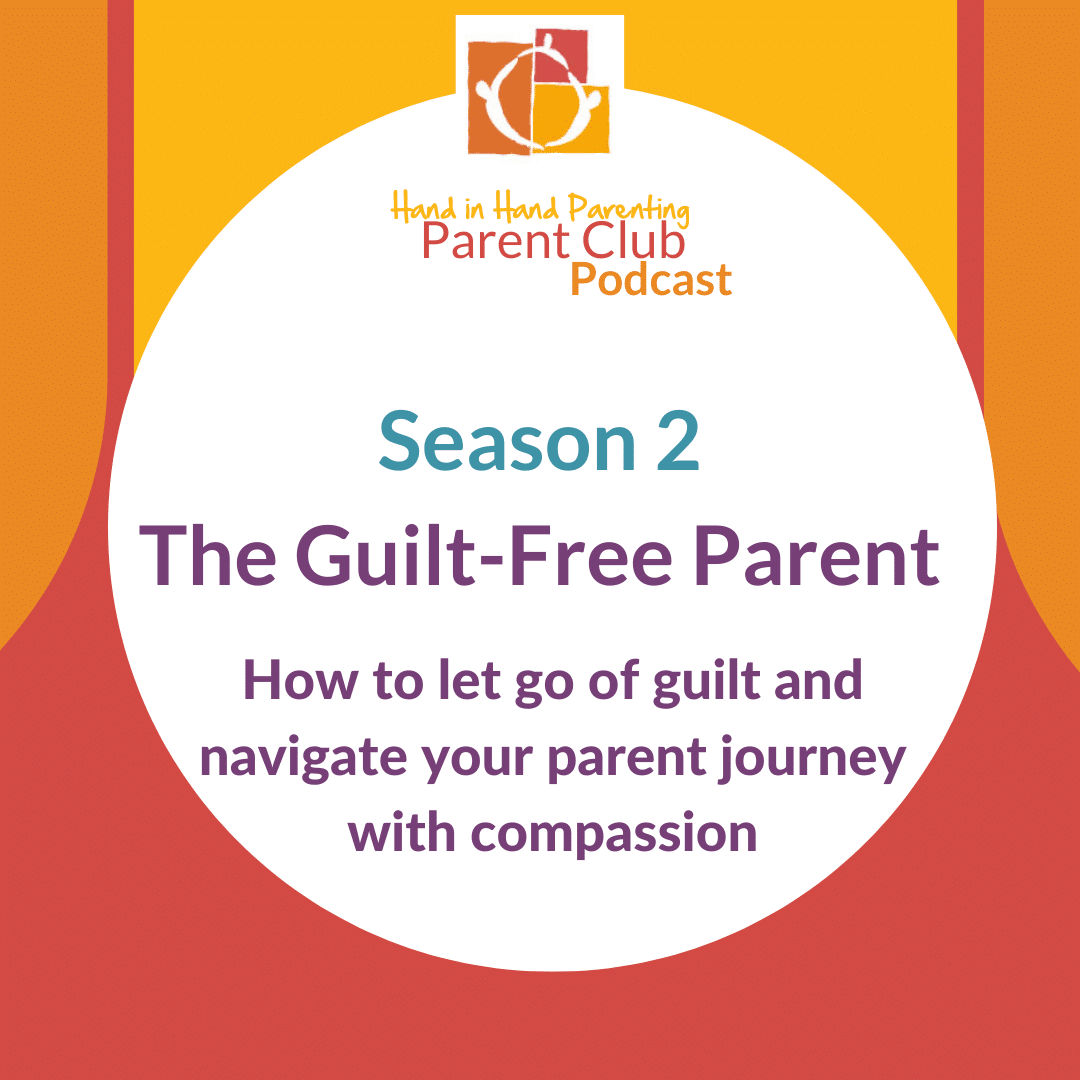Episode Transcript
Speaker 1 00:00:01 Welcome to the hand in hand parent club podcast. I'm Emily Murray, a hand in hand instructor and a mom of
Speaker 0 00:00:06 Two I'm Kathy Gordon, a single adoptive mom of a now young adult son, a hand in hand instructor. And we are both moderators of hand in hand's awesome membership program. The parent club, every
Speaker 1 00:00:18 Week, we'll be answering a parenting question. You'll hear about hand in hand. Parenting's powerful, respectful parenting tools. We'll share how they help you work with your child's feelings, especially when their behavior gets harder. Confusing.
Speaker 0 00:00:29 You can feel good about using these tools. They've brought warmth and connection to our own families and to many thousands of families around the world who are using the hand in hand approach.
Speaker 1 00:00:39 That's why hand in hand and the parent club exist. We're here to support you and your family. So you have more good, sweet fun times together. Hi everyone. Welcome back today. We're talking about why this can feel so hard. Sometimes hand in hand parenting ideas. Can they sound like good ideas, but they can feel so hard to pull off in the moment. Why does it feel so hard? Why do I resort to threats and yelling still?
Speaker 0 00:01:09 And we've been talking about the reasons underneath, underneath our kids, infuriating behaviors. Well, there are reasons underneath our behaviors too. There are reasons why we can't think, and it's pretty well researched that our childhood and how we were parented affects the way that we parent it's like a template in our brain. And we often default to that template when we can't think we may have been yelled at when we were small. I know that I was. And so that was one of my defaults to yell and our, our, or our child's behavior might remind us of a sibling. Or if, if one sibling is, um, hitting another sibling, maybe we were hit, uh, uh, as a child by our sibling. And so we can be overwhelmed, worried, and afraid. You know, we got these early messages of not being enough, early messages of something being wrong with us. And so when we feel powerless in that moment, that's what comes up and that's can be why we get tight and we resort to yelling or threats in that moment.
Speaker 1 00:02:31 So I, I remember early on when I first found hand in hand parenting, um, I used the listening partnership tool from hand in hand parenting as a place to, I don't know, direct all of the things that I wanted to say and do in the moments when I was feeling tight or reactive with my daughter. Um, I, I kind of PO I was able to pause them in the moment. So I wasn't reacting at her quite as much anymore, but they were still there. I could still feel them bubbling and threatening to come out. So when I, you
Speaker 0 00:03:09 Were sort of white knuckling it, you
Speaker 1 00:03:11 Know? Yeah, yes, yes. It was not like authentic relaxation and just delight coming at her. It was, I'm not gonna yell,
Speaker 0 00:03:21 <laugh> gritting your teeth.
Speaker 1 00:03:22 Yeah. So what I did was I brought those feelings to my listening partnership. And in the listening partnership relationship, it's a safe place for you to say those things out loud because your listening partner, isn't gonna judge you. They're gonna know that you're working really hard, not to actually say those things so you can really let it loose. So, um, you know, I would say really yucky things, very loudly. Um, at my listening partner, I would kind of pretend, all right, you're my kid. I didn't yell earlier today, but I need to yell now you little, how dare you. And, oh, it, it was so it felt so good to get it up and out and just clear it out of my system. So I didn't have to hold it in anymore. And other examples of using listening partnerships in this way are, uh, you know, weeks where I'm feeling particularly overwhelmed, um, with something or just, you know, there's too much on my plate or I can't possibly handle this behavior one more time.
Speaker 1 00:04:24 You know, I can't do bedtime like this one more time. I get listening time where I can say, that's it. I quit. I quit. I'm not doing it anymore. And my listening partner, cheers for me. And, um, you know, a, another one might be, um, you know, you hear us suggesting playful, uh, limits. And you're like, no, I can't even no way bring that to listening time and say, Emily, there's no way I'm doing that. How dare you suggest that I won't do it. I'm having a hard day, too, whatever you want, you can direct that out at, at your listening partner.
Speaker 0 00:05:00 You get to have your own tantrum.
Speaker 1 00:05:02 Yes. Do it. It feels so good because these old patterns and reactions are like, well, worn paths in our brain. Um, this is how we've been reacting. This is how we were potentially treated when we were little, or we've seen this play out so much that it's really, um, it's easy for our brain to fly through and just do it. So when we are trying to do something else, it's kind of like, you know, here's the well worn path and, and to our right, we kind of caught a glimpse of a, you know, a little parting in the grass to our right. But we had to really look for it. So each time we practice these different ways and we catch that path and we take it, we're making a new path. And the next time we go by, it's gonna be more visible and easier to find. Um, and then eventually that's your, that's your primary path. You can go there every time. So you're really training your brain to respond differently. Um, when you can use your listening partnerships, practice the tools, forgive yourself on days where it just doesn't work out. You just, you missed the path. Whoops. I'll try to find
Speaker 0 00:06:16 We have those days.
Speaker 1 00:06:18 Yeah. Yep.
Speaker 0 00:06:20 Yeah. But I love Emily about what, you know, I started out, we started out talking about how, um, our childhood affects, uh, uh, how we were parented and, and we, you can absolutely, that's like one of the main reasons to use listing partnership. But what I love is how you're explaining is that you, you started out using listing partnerships where you kind of like worked on the, the current upset, the current things that were bothering you. And that's like peeling off the crust. Yes. Before you can get to the harder stuff. Um, so if you haven't guessed by now, we're talking about, uh, hand in hand parent to parent support tool called listening partnerships. And it's pretty simple how it works. You find another adult or parent you get together on the phone or in person. Now we, you know, hope. Now we can get together more in person or zoom.
Speaker 0 00:07:18 Zoom works really well. Cuz you can see them, you divide up the time you say, oh we got 30 minutes. So let's do like 12 minutes each. So we have a little time for transition and you put the set, the timer, one person, uh, your partner listens to you. They hold the space for you. They hold this thought that you're good, that everybody you're talking about is good. So like if you blast your kids, they're holding the truth that your kids are good. And um, and that you're figuring this out. That's, that's what they're thinking. As they're holding this space for you and you you're working in that space and you can talk to your kids, you can talk to your parents, you could talk to your younger self, you can talk to that second grade teacher who, you know, who slapped your hands with the ruler.
Speaker 0 00:08:05 Um, and um, and then when the time, you know, you're getting all that stuff up and out, working on current tensions and early tensions. And then when the timer goes off, you're quite your, partner's gonna ask you a silly little question that doesn't have anything to do with anything like, you know, what are three sports that don't need a ball, um, or, you know, what are the shape and color of three road signs. We call this a refresher question and that gets your attention outta your feeling, place into your thinking back up into your thinking brain so that you can switch. And now you can listen to them. And a couple of important, um, the article that's gonna go along with this podcast is gonna give you more specifics about the mechanics and the guidelines, but just two important things to mention is that, um, uh, well maybe three, no, no interrupting.
Speaker 0 00:08:55 You're not gonna interrupt while you're listening. You're no advice. Um, you're just listening and no referring or reflecting back or, you know, um, uh, talking about anything that's said in listening time is it, it stays there. Um, so, uh, it's never referred to again and that's what creates the safety. So for me, how listening time, we, we just talked about, you know, those well worn patterns and if you were yelled at, as a child, then your default might be yelling. And that was definitely true for me because my father was a yeller, you know, that red face and, you know, always like, even know, just know is that, so when I was stressed, when I felt powerless and tight, that was my default. So I worked on how that felt as a child, how scary that felt. And I got to blast my father in the, in, in the listening time, cuz remember my partner's holding the truth that he was doing the best he could be based on his childhood and his parents.
Speaker 0 00:10:06 So I got to blast him. I especially got to stand up for myself. You know, I am smart, I am capable. And often those two things of blasting him, stop yelling at me. You don't get to yell at me and standing up for myself. Then the grief would bubble up the sadness that my childhood, there are parts of my childhood that were pretty, pretty darn scary. And um, so being a, being able to do this, being able to work on that, allow that grief to come up and, and stand up for myself and blast the, the way, you know, that fact that I wasn't, that it was scary when I was a child that cleared a whole chunk of that out. So that then when I felt powerless in the moment, there was, I could stay connected to my thinking brain and think of bringing a warm limit or being playful. Um, instead of getting overwhelmed in, again, the face of my son, son's aggression or digging in his heels.
Speaker 1 00:11:09 Yeah. It's so powerful when we can do that, that older work, it really does. Um, I find that, you know, you know, when you're at the end of your rope, <laugh>, you're like I'm there. I feel the end of my rope. It gives you more rope. Um, so, and it gives you like a quicker ability to think and respond the way you want to. It's so incredibly simple but powerful. So our one small thing for you, um, this week is to, to try that, try standing up for yourself. Um, so it might look like blasting your child and say, I won't let you talk to me that way. Or it might be someone, um, who might have been scary, uh, in your childhood. I think we all probably have that one teacher that, um, made us feel small or, um, or, you know, implied that we weren't smart. Um, so stand up to them. I am smart. Look at me, go look at all the things I've done and your partner will, your listing partner will hold the truth. That they're good. They did the best they could. Um, so you stand up for yourself and see what else bubbles to the surface underneath that hurt that that might need some healing.
Speaker 0 00:12:17 And if you don't have a listening partner, if you've never done listing partnerships before we have lots of resources for you on our website, in our community groups and especially in the parent club.
Speaker 1 00:12:31 So this concludes our first season of the parent club podcast. We are so honored to, to bring you the hand in hand approach, to give you these one small things you can experiment with each week and just glad to be here with you
Speaker 0 00:12:44 For more of us, Kathy and Emily, join us in the parent club and we'll be back next season with more hand in hand, helpful parenting tips, along with one small thing. Each episode we are so honored to bring a hand in hand approach to you. We think you are doing awesome. Work. Parenting is a very difficult job. We are here for you when parenting gets hard.
Speaker 1 00:13:10 Thank you so much for tuning into the hand in hand parent club podcast, please like, and subscribe to hear more and to connect with us between these episodes. Come on over to hand in hand parenting.org to join the parent club where you can get coaching classes and live support.
Speaker 0 00:13:23 Come join our vibrant community of parents in the parent club who are committed to getting the support they need to be the parents they wanna become. We'd be honored to support you too. This podcast and the parent club are part of hand in hand parenting, a nonprofit organization that supports parents all over the world. We are here for you when parenting gets hard.


